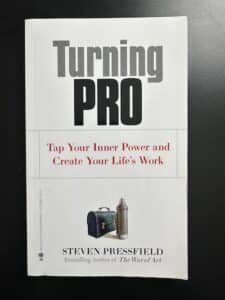Turning Pro by Steven Pressfield
Reading Time: 3 minutes
Summary
In The War of Art, writer Steven Pressfield argues that the antidote to Resistance – the ultimate killer of creative dreams – is turning pro. Turning Pro is a follow-up book that answers the important question: “How exactly do you turn pro?” Pressfield reveals practical and actionable tactics that will help you transition from amateur to professional status in your craft.
Key Takeaways
Ambition
“Ambition, I have come to believe, is the most primal and sacred fundament of our being. To feel ambition and to act upon it is to embrace the unique calling of our souls. Not to act upon that ambition is to turn our backs on ourselves and on the reason for our existence.”
Shadow careers
“Sometimes, when we’re terrified of embracing our true calling, we’ll pursue a shadow calling instead. That shadow career is a metaphor for our real career. Its shape is similar, its contours feel tantalizingly the same. But a shadow career entails no real risk. If we fail at a shadow career, the consequences are meaningless to us.
“Sometimes it’s easier to be a professional in a shadow career than it is to turn pro in our real calling.”
You can spend your whole life living a shadow career. But it’s turning pro in the craft of your calling that will bring you enduring fulfillment.
Professionals vs amateurs
- Amateurs have amateur habits. Professionals have professional habits.
- Amateurs are addicts; professionals are artists.
- Amateurs use addiction (distractions, displacement activities, drugs, etc.) to run away from their calling, which is the obligation to become our truest and highest selves.
Addiction
Every addiction shares two qualities:
- They embody repetition without progress.
- They produce incapacity as a payoff.
Stanislavsky’s 3 questions
- Who am I?
- Why am I here?
- What do I want?
Resistance
“Resistance hates two qualities above all others: concentration and depth. Why? Because when we work with focus and we work deep, we succeed.”
Qualities of amateurs
- Amateurs are terrified
- Amateurs are egoists
- Amateurs live by the opinions of others
- Amateurs permit fear to stop them from trying
- Amateurs are easily distracted
- Amateurs seek instant gratification
- Amateurs are jealous
- Amateurs lack compassion for themselves
- Amateurs seek permission
- Amateurs live for the future and live in the past
- Amateurs will be ready tomorrow
- Amateurs give away their power to others
- Amateurs are asleep
Turning Pro
Turning pro is a decision. It’s a decision to pursue your calling in the face of overwhelming fear. It’s a decision to structure your life to confront that fear day after day. It’s a decision to develop the habits that your professional craft requires. It’s a decision to wake up.
“The pro mindset is a discipline that we use to overcome Resistance. To defeat the self-sabotaging habits of procrastination, self-doubt, susceptibility to distraction, perfectionism, and shallowness, we enlist the self-strengthening habits of order, regularity, discipline, and a constant striving after excellence.”
Professional qualities
- Shows up every day
- Stays on the job all day
- Committed over the long haul
- The stakes are high and real
The professional is:
- Patient
- Seeks order
- Demystifies
- Acts in the face of fear
- Accepts no excuses
- Plays it as it lays
- Does not show off
- Dedicates himself to mastering technique
- Does not hesitate to ask for help
- Does not take failure or success personally
- Does not identify with his or her instrument
- Endures adversity
- Self-validates
- Reinvents himself
- Is recognized by other professionals
A few other qualities of the professional:
- Is courageous
- Will not be distracted: “The amateur tweets. The pro works.”
- Is ruthless with himself
- Has compassion for himself
- Lives in the present
- Defers gratification
- Does not wait for inspiration
- Does not give his power away to others
- Helps others
Two salaries
- Financial salary: money, applause, attention
- Psychological salary: the feeling we get from doing the work for the sake of itself
Developing a practice
Professionals follow a practice, which is “a rigorous, prescribed regimen with the intention of elevating the mind and the spirit to a higher level.” This is true for writers, yogis, bankers, and directors.
A practice has a few elements:
- A space: a unique place to work on your craft
- A time: a period where you work on your craft
- An intention: To get better, go deeper, etc.
- Lifelong: There is no finish line.
When resistance is really strong
- Take what you can get and stay patient. The defense may crack late in the game.
- Play for tomorrow.
- Remember that you’re in it for the long haul. One bad day is nothing.
🙈 That's all for now! If you enjoyed this piece...
📚 If you want to discover more great books...
Explore the best books for expanding your mind, the best self-help books, the best philosophy books for beginners, books for people who don't enjoy reading, and more great books.
You might also enjoy these book notes...
- On Writing Well: The Classic Guide to Writing Nonfiction by William Zinsser
- Wild Mind: Living the Writer’s Life by Natalie Goldberg
- The Creative Act: A Way of Being by Rick Rubin: Summary & Notes
- Do the Work by Steven Pressfield
- Creativity, Inc.: Overcoming the Unseen Forces That Stand in the Way of True Inspiration by Ed Catmull
- Reinvent Yourself by James Altucher
- Tribes: We Need You to Lead Us by Seth Godin
- The War of Art by Steven Pressfield
- Show Your Work! by Austin Kleon


